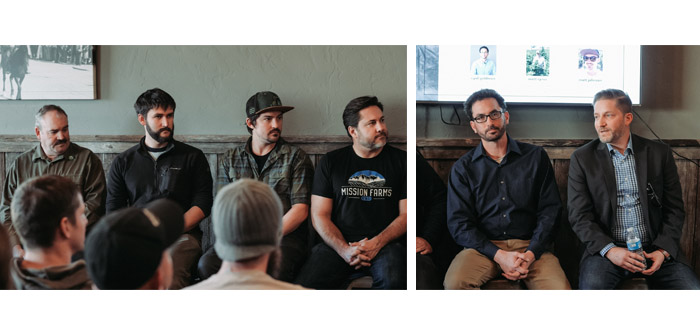Left: (L-R) Hemp Panel representatives Matt Cyrus, owner Triple C Farms; Evan Skandalis, VP of Farms Operations for Lazarus Naturals; Matt Johnson, Zero Point Extraction Chief Production Officer and Ben Joyce, Mission Farms CBD Chief Executive Officer
Right: (L-R) Phase 2 Extraction executives Eyal Goldman, President, and CEO Brett Stokes | Photos Courtesy of Morningstar Films
Crook County is proving fertile ground for exponents of the bourgeoning hemp market, and EDCO’s Prineville-based branch recently hosted an industry-focused panel about the growth of farming and processing companies in the region, illuminating the current state of the sector and forecasting trends related to extraction methods and end-user products.
The event was moderated by Mylen Bohle, of Oregon State University’s Central Oregon Agricultural Research Center, and featured the perspective of representatives from six regional companies, including: Prineville-based Deschutes Labs, Lazarus Naturals, Phase 2 extraction and Zero Point extraction, as well as Mission Farms CBD of Bend, and Sisters’ Triple C Farms.
After relatively recent de-regulation of the crop, Central Oregon, and the state in general, is trying to take the lead on what many believe to be the agricultural phenomenon of the future, though a recent glut of raw biomass product caused by a “Wild West” rush of new entrants to the industry has led to a significant drop in price per pound currently.
Industrial hemp is either sold as flower, or processed into all manner of products, including cannabidiol (CBD) oils, lotions and CBD-infused food and drink.
“It’s a beneficial product,” said Cyrus, a Sisters area hemp grower and president of the Central Oregon Hemp Association.
“I expect in ten years to be a standard ingredient in everything from dog food to soft drinks.”
Bohle pointed out that Industrial hemp (Cannabis sativa L.) was actually grown as a commodity fiber crop in the United States from the mid-18th century until the mid-1930s, including in Oregon, but legislation was introduced banning all marijuana-related activity, which, he said, led the U.S. “to miss out decades of potentially beneficial research.”
With evidence of its use recorded throughout history, including the discovery of material made from hemp over 10,000 years ago, many believe that hemp was the first crop ever cultivated by mankind.
It has the capabilities to produce crucial resources such as food, rope, clothing, paper, housing material and more, and is thought to have been the catalyst for man’s earliest innovations.
CBD is the second most prevalent of the active ingredients of cannabis (marijuana) and is derived directly from the hemp plant, which is a cousin of the marijuana plant.
After the passing of the Marijuana Tax Act of 1937, which imposed heavy taxes on the possession, sale and transportation of the plant, the federal government did not make any distinction between varietals and had effectively banned “marijuana,” paving the way for 80 years of cannabis prohibition. CBD is a component of marijuana (one of hundreds), but by itself it does not cause a “high.”
But the Farm Bill of 2014, amended in 2018, decriminalized the cultivation of industrial hemp — as long as it contained 0.3 percent or less of THC, the psychoactive compound of marijuana which can produce euphoric-type effects — and designated the USDA Agricultural Marketing Service to develop regulations regarding hemp production.
Now the term hemp is generally used to describe non-intoxicating Cannabis that is harvested for the industrial use of its derived products.
Bohle noted, “Due to its criminalization, hemp missed out on 20th Century science and technology advances, but we see significant new discovery space is ahead with a global need for hemp industry plants.”
He said OSU is taking a lead in kickstarting renewed innovation and has launched the nation’s largest research center devoted to the study of hemp and will begin certifying hemp seed for planting in Oregon.
The Global Hemp Innovation Center will be based in OSU’s College of Agricultural Sciences with research taking place across the state and world. Currently, there are more than 40 OSU faculty representing 19 academic disciplines engaged in hemp research, teaching and extension services.
The center will serve as a research hub connecting faculty and researchers engaged in plant research, food innovation, pharmacy, public health, public policy, business and engineering.
Bohle said Oregon’s “newest crop” saw some 63,000 acres being registered in the state for its cultivation in 2019, covering 1940 growers.
And Crook County is ideally placed in the 45th parallel — a circle of latitude exactly halfway between the Earth’s Equator and North Pole noted for ideal growing conditions with distinct seasons.
Brett Stokes of Phase 2 Extraction — which operates in a 23,000 sq. ft. extraction facility in Prineville that specializes in processing industrial hemp into crude oil and distillate oils rich in non-THC cannabinoids like CBD, CBD isolate and water-dispersible products — said the company has already exceeded growth and sales expectations.
He said, “This is a new and rapidly growing industry and Prineville has been a supportive partner in creating a pro-active business environment and the necessary infrastructure for us to succeed.
“We have the right team in place to set industry standards and are actively looking to create long term business relationships with other like-minded industry leaders.”
Cyrus added, “Hemp is a high-risk, high-reward crop.”
“Some people with no experience are learning that farming hemp isn’t easy. You have to understand it to do a good job with it.”
He said that getting the genetics right is a big challenge for hemp farmers. Seeds from other parts of the country may not grow well in Central Oregon and do not mature in this area’s short growing season.
And there is a bottleneck on the processing side, with many farmers forced to have product sit in bags until it can find a processing outlet and ultimate buyer. The oversupply has seen prices fall to under $10 for a pound of hemp biomass versus when the market opened in 2015 and prices were closer to $100 a pound.
Despite the challenges in the unpredictable market, Cyrus believes the industry will continue to widen as new buyers of CBD products embrace its reported benefits.
Deschutes Labs is a vertically integrated industrial hemp processing lab and has established a complete hemp supply chain solution designed to serve the needs of companies selling consumer products with hemp extracts.
CEO Julyn Andrews urged anyone looking to get into the industry to “start small.” He added, “Do your homework before you plant. You need to have a game plan for monetizing the finished product and in being competitive for the long haul.”
Phase 2 Extraction President Eyal Goldman said, “We are very appreciative of the city of Prineville and the county who have been great to work with, and in ensuring we have the right infrastructure in place.”
Evan Skandalis, VP of farm operations for Lazarus Naturals, which is headquartered in Seattle, observed that the company’s farming facility in Powell Butte enjoyed an ideal climate for the cultivation of hemp as well as good transit networks connections.
Cyrus, who sits on a legislative advisory work group exploring how best to implement USDA rules, encouraged people in the industry to “stay in the middle of what’s going on politically.”
He said, “My family has been here since the 1880’s. In 2016 we expanded our farm operations into hemp production, and it’s been something of a wild ride, experimenting in how best to raise crop, and for one thing, you’ve got to make sure you use reputable seed growers.
“One advantage we do have in Central Oregon, is that the climate means it can be feasible to dry in the field versus the (Willamette) Valley where damper conditions mean farmers often have to utilize industrial mechanical driers, which adds to operational costs.”
Skandalis added, “The harvest side of the equation can be very challenging. An entire crop can be wiped out by, say, an unseasonable frost event.
“You need to have a fully cohesive plan, including factoring in the variable costs of production, drying and so forth.”
Stokes said, “One of the biggest concerns is minimizing costs of production to stay competitive. It is advisable to get biomass into a processed form such as oil as expediently as possible so the raw product won’t be at risk of degrading through moisture intrusion, which creates mold and can ruin the integrity.”
All panel attendees agreed that the banking sector had been slow to get behind the industry, which had hampered growth potential and necessitated more of a need for private investment, though the financial environment was gradually easing.
Ben Joyce, CEO of Mission Farms CBD which launched its line of consumer products in 2018, said, “Demand for CBD products is on the rise nationally, but there is a challenge in getting one’s name out there as hemp-related products are still blocked on a lot of primary advertising channels like Google and Amazon, but hopefully that will change in the near future.”
Stokes said the current glut of raw material could see many more inexperienced operators “weeded out” but added, “I think we are seeing things start to plateau.
“The focus needs to be on cost reduction and streamlining processes. The market almost inevitably has to go back up to some degree based on supply and demand.”





